 Petzlover
Petzlover Fila Brasileiro is originated from Brazil but German Coolie is originated from Australia. Fila Brasileiro may grow 15 cm / 6 inches higher than German Coolie. Fila Brasileiro may weigh 56 kg / 124 pounds more than German Coolie. Fila Brasileiro may live 6 years less than German Coolie. Fila Brasileiro may have more litter size than German Coolie. Fila Brasileiro requires Moderate Maintenance. But German Coolie requires Low Maintenance
Fila Brasileiro is originated from Brazil but German Coolie is originated from Australia. Fila Brasileiro may grow 15 cm / 6 inches higher than German Coolie. Fila Brasileiro may weigh 56 kg / 124 pounds more than German Coolie. Fila Brasileiro may live 6 years less than German Coolie. Fila Brasileiro may have more litter size than German Coolie. Fila Brasileiro requires Moderate Maintenance. But German Coolie requires Low Maintenance
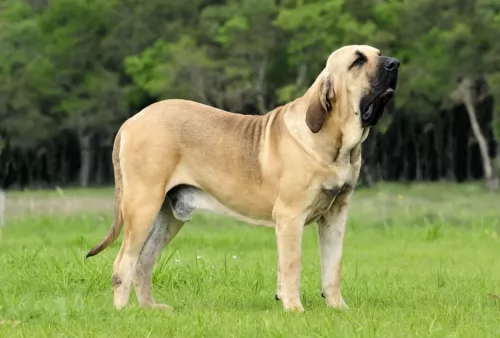 Hailing from Brazil, and known also as the Brazilian Mastiff, nobody seems to be too sure of the exact origins of the large Fila Brasileiro but it is believed to be a cross between the English Mastiff, the Bulldog and the Bloodhound.
Hailing from Brazil, and known also as the Brazilian Mastiff, nobody seems to be too sure of the exact origins of the large Fila Brasileiro but it is believed to be a cross between the English Mastiff, the Bulldog and the Bloodhound.
Other theories are that the dog comes from a mix of Portuguese and Spanish dogs and that they were bred to guard livestock from predators. Breeds that have no doubt contributed to the modern Fila are the Bullenbeisser, the Bloodhound, Mastiff and Rafeiro do Alentejo. All these dogs have characteristics such as excellent working dog skills, herding instincts as well as courage and tenacity.
The official Brazilian breed standard of the Fila was developed in the 1960s and the Fila Brasileiro Club of America was formed in 1984.
 The German Coolie is misnamed as it is an Australian bred dog and often called the Australian Koolie or Coolie. This Australian breed is more often just called a Coolie. The breed is a typical herding breed and a working dog that needs a job all the time. They have been a favorite of Australians since the late 1800’s when local dogs were bred with British working dogs.
The German Coolie is misnamed as it is an Australian bred dog and often called the Australian Koolie or Coolie. This Australian breed is more often just called a Coolie. The breed is a typical herding breed and a working dog that needs a job all the time. They have been a favorite of Australians since the late 1800’s when local dogs were bred with British working dogs.
Although all Coolie’s are not the same. Within the breed there is a lot of variation. This is because the Coolie was bred individually for different regions in Australia. In a very different writing the Koolie Club of Australia does not define the Coolie breed on confirmation as all other purebred dogs are defined. Instead the Coolie is defined by ability to work. In light of this most Coolie breeders state that the Coolie is a breed and the variations you see among regions are types within the breed.
As a herding dog, the Coolie brought a lot of skill to the Australian farmers and sheep herders. The Coolie will round up the sheep and bring them back to their enclosure at the shepherd’s command. They are upright, silent, working dogs. Not only do they herd sheep they are important at sheering to “cut out” the sheep or assist in the close quarters of lambing.
In Queensland North and New South Wales, the Coolie is medium boned, tall and agile ready to herd cattle over a long stretch of miles. In the Snowy Mountains of New South Wales and the Hunter Valley Region, the Coolie is shorter and thicker in order to be able to get cattle that are lying low out from the gullies and dense bush. The Coolies found in Victoria are the smallest of all.
No matter where they live and work, the Coolie is bred to help the workers there, the farmers, the stockman, and the grazier. All Coolies are adaptable and very agile. They all have a strong willfulness to accomplish what they are asked to do. The ancestors of these various Coolie was the British Collie – a smooth coated, blue merle. This Collie was crossed with the Black and Tan Collie from the Scottish Highlands. It is believed that these are the same Collie breeds that came to Australia to create the Heeler.
The name may come from the German immigrants working in South Australia and unable to pronounce Collie incorrectly they called the dogs German Coolies. There is also a fraction of German breeders who believe that the German Tiger dog was brought to Australia in the 18th century and then when the Collies came they were bred together. Many Coolie breeders have records showing that the breed has been in Australia for at least 160 years. It is also believed that the Border Collie and Kelpie (Blue Heeler) were mixed into the breed at sometime as well.
No bench standard exists for the German Coolie even though there is the Koolie Club of Australia. The mission of the club is to protect, preserve and promote the breed. The Australian Sporting Register was recognizing the Coolies in 2004. They are eligible to participate in the Australian National Kennel Council sanctioned sporting trials. They participate in Queensland, New South Wales and Victoria through the individual states sporting register. Here they participate in herding, jumping, obedience, agility and tracking.
Several other recognitions as a herding breed soon followed. The Australian Shepherd Club of America, the American Herding Breed Association, were followed by recognition from others as well. They are not recognized by the American Kennel Club (AKC).
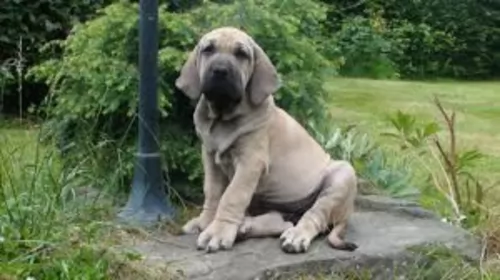 With his huge head covered in loose skin much like that of a Blooohound, and a body resembling that of a Mastiff, the large heavily built Fila Brasileiro is a mastiff breed from Brazil. He stands at 60 to 75cm in height and he weighs roughly 55 to 80kg.
With his huge head covered in loose skin much like that of a Blooohound, and a body resembling that of a Mastiff, the large heavily built Fila Brasileiro is a mastiff breed from Brazil. He stands at 60 to 75cm in height and he weighs roughly 55 to 80kg.
The ears of the Fila are large and droop down or are folded back, depending on his mood. The tail is long and slim. The coat of the dog is short and dense with the texture being quite smooth and soft. Colours of the coat can vary from solid fawn or black to red to brindle.
Perhaps the huge Fila wouldn’t be a good choice as a pet for the first-time inexperienced dog owner as he is a powerful, intelligent, self-assured, headstrong animal that will certainly need to have training and socialization if you want him as an obedient pet in your home.
He is a dog known for his courage and bravery. The Fila is loving and affectionate with his human family, being protective of them and not being too friendly with strangers. He isn't a particularly good pet choice with children in the home.
Some people, after buying a cute Fila puppy, put him out in the yard when he becomes large, and then they pretty much neglect him. This is cruel and irresponsible as he is a social, playful dog who wants to be part of his human family.
These dogs have some aggression in them and this makes them good watchdogs. They generally don’t show aggression towards their family but may snap at a stranger who tries to touch as he feels threatened.
 With their strong ancestry among the family of collies and herders, the German Coolie shares the look of collies and shepherds. Even though they differ from region to region and there is no actual standard, they are medium sized dogs with blue or brown eyes or even one of each. The ears are folded over on top when relaxed but they are rigid and straight when he is more alert. The nose is either chocolate or red depending on the color of their coat.
With their strong ancestry among the family of collies and herders, the German Coolie shares the look of collies and shepherds. Even though they differ from region to region and there is no actual standard, they are medium sized dogs with blue or brown eyes or even one of each. The ears are folded over on top when relaxed but they are rigid and straight when he is more alert. The nose is either chocolate or red depending on the color of their coat.
They can have either a long, medium or short coat but most owners want the short coat that is smooth as well. The coat can be one color – red/chocolate or black; Bi – red/white or black/white; Tri – solid black or red with white and brown; Tri merle -merle with white and brown; Merle – red merles and blue merles. Regardless of color, the German Coolie has the look of a collie or German Shepherd.
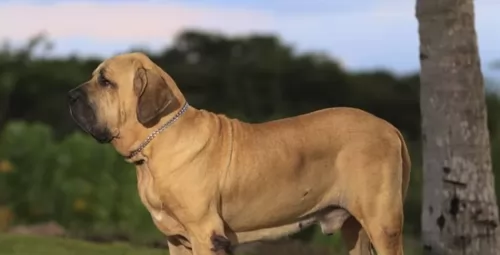 The Fila Brasileiro or Brazilian Mastiff is a powerful dog and it is believed that a large dog like this can be a danger to people if he isn’t trained and socialized.
The Fila Brasileiro or Brazilian Mastiff is a powerful dog and it is believed that a large dog like this can be a danger to people if he isn’t trained and socialized.
He is therefore not recommended for first time dog owners or homes with small children. He is a dog that is particularly wary of strangers too.
When he has been properly socialized he can be loving, loyal and obedient because it is essentially how a dog is brought up as to how he turns out.
If you bring one of these big, beautiful dogs into your home, have him socialized as a puppy, treat him firmly, but kindly and you could have yourself an extraordinary pet.
 Yes, they can be very friendly with children is they are socialized and supervised.
Yes, they can be very friendly with children is they are socialized and supervised.
They have enough stamina to work for 14 hours a day.
They are very adaptable. They can be calm and steady when working a mother and baby lamb and then be able to forcefully move steers, bull, rams or weathers.
The breed is highly intelligent, and their learning ability is excellent because they want to please you.
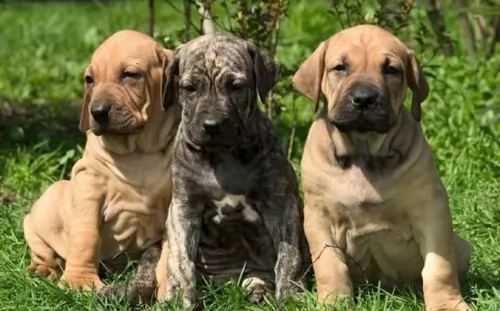 Filas are a dog breed who have a high rate of hip- and elbow dysplasia. This is a serious disease which can lead to lameness with your pet. Other orthopedic diseases with the breed include osteochondritis and luxating patella.
Filas are a dog breed who have a high rate of hip- and elbow dysplasia. This is a serious disease which can lead to lameness with your pet. Other orthopedic diseases with the breed include osteochondritis and luxating patella.
Also, as a deep-chested dog breed, your Fila also is at risk of getting the very serious gastrointestinal syndrome known as bloat. This is a common condition that can prove deadly for your pet. The Fila’s stomach will fill with gas, putting pressure on other organs and stopping blood flow to the heart and difficulty with breathing. Sometimes the stomach will twist. Get him to the vet immediately if you notice a swollen stomach, drooling or restless behaviour.
 This is a relatively healthy breed without many genetic disorders found in purebreds due to the 160 years they have spent fairly isolated and allowing natural selection to take its course.
This is a relatively healthy breed without many genetic disorders found in purebreds due to the 160 years they have spent fairly isolated and allowing natural selection to take its course.
In Merle dogs there can be deafness and/or blindness. If you breed a solid to a merle you can eliminate that.
These are not inherited but rather acquired due to the immense amount of jumping and running.
Rare but it does occur and can be fatal if not treated
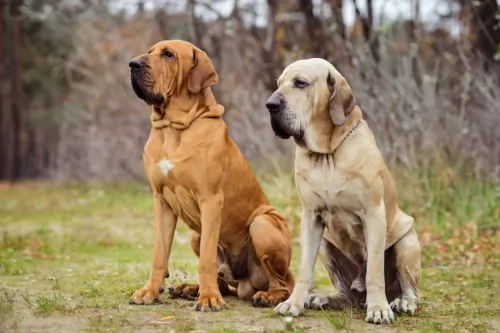 The Filas size makes it important that he have a good amount of exercise if you want to maintain his health and happiness. He isn’t a dog suited to city life as he is too large and will irritate his owners when cooped up in a tiny space with them. He isn’t demanding when it comes to exercise and activities all the time, but he should still be exercised regularly as he is inclined to become lazy .
The Filas size makes it important that he have a good amount of exercise if you want to maintain his health and happiness. He isn’t a dog suited to city life as he is too large and will irritate his owners when cooped up in a tiny space with them. He isn’t demanding when it comes to exercise and activities all the time, but he should still be exercised regularly as he is inclined to become lazy .
Moderate shedding. Regular brushing twice a week will be required. Check ears for infection and brush his teeth 2 or 3 times a week.
Nothing is set in stone as to what to feed your Fila Brasileiro, but a large dog will require quality food with a good amount of protein and fat according to size, age and activity levels.
Because a large breed dog is prone to hip dysplasia, look out for ingredients such as chondroitin and gludosamine which are specifically good for joint health. Try and avoid commercially manufactured food with common allergens such as soy, corn and wheat, artifical flavors and fillers.
A source of cooked rice, chicken and vegetables as well as some raw meat will be excellent for your big pet. Make sure he is never deprived of fresh, cool drinking water.
 Break meals into 3 a day feeding a high quality dry puppy food designed for dogs of his size. 11/2 to 2 cups per day.
Break meals into 3 a day feeding a high quality dry puppy food designed for dogs of his size. 11/2 to 2 cups per day.
Break meals into 2 a day feeding a high quality dry adult food designed for dogs of his size.
Traditionally good health. Great energy, intensity and devotion to work and owner.
This is an energetic dog that loves to work and needs to work. Regular routine exercise is needed daily. He needs to be stimulated mentally and physically. Find him a job. Make sure he knows what you want him to do. They work well with a human partner in games such as agility, tracking, flyball and herding. They need a large yard and a lot of play time. They are not couch potatoes and would be unhappy if they were stuck in a house or apartment